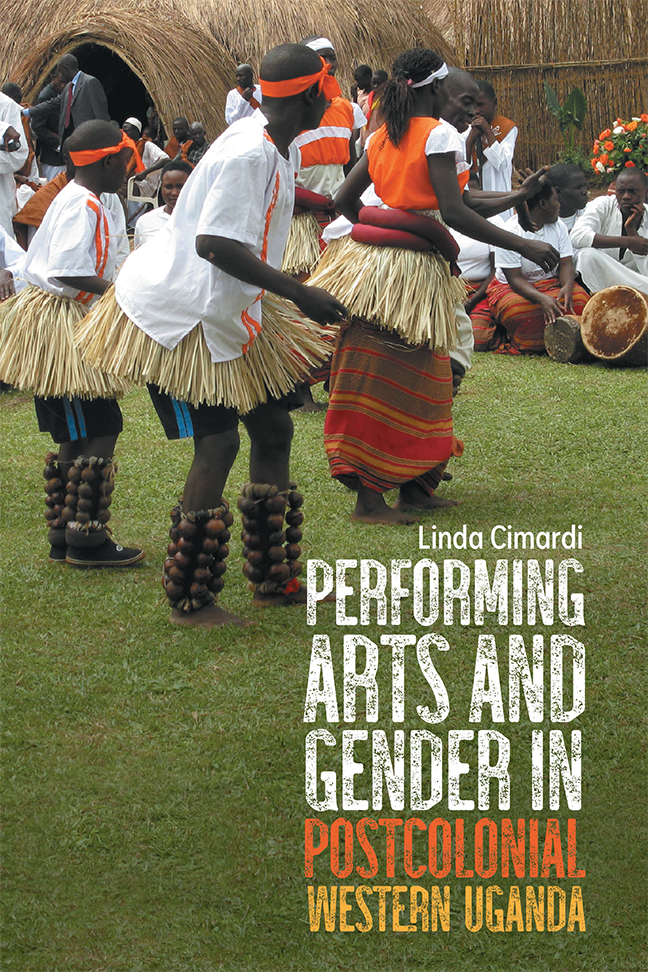Book contents
- Frontmatter
- Contents
- List of Illustrations
- Foreword
- Acknowledgments
- Note on Language
- Note on the Musical Examples
- Note on Online Audio and Video Material
- Prelude: Encountering Local Culture in Western Uganda
- Introduction: Approaching Gender and Performing Arts in Bunyoro and Tooro
- One “Traditional Dance Preserves Culture and Shows People How to Behave”: Runyege, MDD, and Gender
- Two Singing Marriage, Runyege, and Labor
- Three “Women Aren't Supposed To”: Instrument Playing in the Past and Today
- Four Shaking the Hips, Stamping the Feet: The Runyege Dance
- Five Narrating and Representing Local Culture: Theater in Songs and Dances
- Six Trans-Performing and Morality in Cultural Groups
- Postlude: Gendering Culture
- I Glossary of Terms in Runyoro-Rutooro
- II Historical Recordings from Bunyoro and Tooro
- Author's Interviews
- References
- Index
One - “Traditional Dance Preserves Culture and Shows People How to Behave”: Runyege, MDD, and Gender
Published online by Cambridge University Press: 17 December 2023
- Frontmatter
- Contents
- List of Illustrations
- Foreword
- Acknowledgments
- Note on Language
- Note on the Musical Examples
- Note on Online Audio and Video Material
- Prelude: Encountering Local Culture in Western Uganda
- Introduction: Approaching Gender and Performing Arts in Bunyoro and Tooro
- One “Traditional Dance Preserves Culture and Shows People How to Behave”: Runyege, MDD, and Gender
- Two Singing Marriage, Runyege, and Labor
- Three “Women Aren't Supposed To”: Instrument Playing in the Past and Today
- Four Shaking the Hips, Stamping the Feet: The Runyege Dance
- Five Narrating and Representing Local Culture: Theater in Songs and Dances
- Six Trans-Performing and Morality in Cultural Groups
- Postlude: Gendering Culture
- I Glossary of Terms in Runyoro-Rutooro
- II Historical Recordings from Bunyoro and Tooro
- Author's Interviews
- References
- Index
Summary
“Traditional dance preserves culture and shows people how to behave.” This was a fairly typical answer to the question “What do you think about traditional music and dance?” from an anonymous questionnaire that I submitted to S6 Kibiito Secondary School students (Fort Portal, September 14, 2011). In the summer of 2011, as part of my fieldwork, I decided to collect information from among the Nyoro and Tooro youth about their perceptions of and opinions on traditional repertoires and gender relations. It was important to explore the perceptions of young people, who primarily learn these repertoires in school, to counterbalance the data I had collected from elders, who still remembered songs and runyege as performed in the villages. In fact, the population of Uganda is composed mainly of young people: in 2020, 46% of Ugandans were under the age of 142 and most of them have learned, or are learning, traditional repertoires at school, especially by participating in the school festival, or through cultural groups, by watching their shows or actively performing. This answer given by one secondary school student is especially significant because it clearly connects the issue of attachment to local culture with the notion of proper behavior. What consistently emerged from the students’ responses, as well as in interviews and conversations with other research participants, was the perception of traditional performing arts as being fundamental heritage conveying the customs (including language, clothing, staple foods, social activities, and good manners) of local cultures. This is indeed the approach that informs the pedagogical philosophy of several teachers who consider traditional dances as the basis through which to pass on traditional culture (Mabingo 2017). The representativeness of local culture and the identitarian attachment to it is essential in the multiethnic Ugandan context where, drawing on the colonial legacy of identification of ethnicities later implemented in the performing arts through the schools’ festival institution, every culture or ethnicity is believed to have specific performing arts that connote it (Cimardi 2015 and 2017b; Pier 2015). Furthermore, when discussing the focus on behavior in relation to traditional repertoires with students, most of their comments concerning “proper manners” and “good morals” referred to the seemly conduct expected of women, in terms of clothes, appropriate ways of greeting, and showing respect to men; there were also comments directed at men, to do with the payment of the traditional bridewealth and providing economically for the family.
- Type
- Chapter
- Information
- Publisher: Boydell & BrewerPrint publication year: 2023

